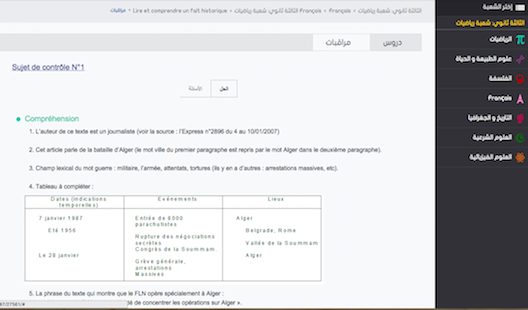How will technology change education in Algeria?


Crowded classrooms, teacher strikes -
Algeria's education is not doing well. (Image via McIlwraith
Education)
“The population has grown very quickly and so there was a need to recruit many professors, without, however, the capacity to offer them adequate training courses,” laments Kamel Haddar, founder of Algérie-Focus and iMadrassa (Arabic for iSchool).
Teacher strikes, overcrowded classroom and inadequate textbooks are undermining the education of young Algerians, according to Karim Sidi Saïd, founder of Dirassatti (Algerian for “my studies”).
“Algerian schoolbooks lack information and don’t provide the correct way to solve the exercises proposed,” he says.
Underscoring the urgent need for educational reform, many students rely on private lessons.
“Today, we need new technologies in order to offer scalable-quality education,” Haddar says.
He is referring to education that is timely, accessible and low-cost.
While Sidi Saïd, 21, launched Dirassatti to fulfill his personal need, Haddar by a duty he felt as a citizen when he developed iMadrassa.
“Education contributes to economic development, but also to peace and tolerance,” Haddar says. “If we educate our children, there won’t be any more “Da3ech” [ISIS].”
Courses, in his opinion, should be dedicated to the correction of exercises and not for the teaching of the lessons which can be easily learned at home, and which can be found abundantly on the internet.
Dirassatti aims to help students learn

Dirassatti offers exercises, quizzes, video courses, and
evaluation sheets. (Image via Dirassatti)
Dirassatti offers clear, educational resources and content in one place. Launched about a year ago, the service provides senior-year high school coursework and quizzes in math, physics, and life and earth science, all prepared by national education teachers in conformity with curriculum set by the Ministry of Education. Coursework is offered in written form or videos.
Dirassatti got a boost 2014 after Sidi Saïd won the 2014 edition of the Tstart business plan competition, and consequently obtained funding, coaching, and a place to work at telecom operator Ooredoo’s incubator. The team consists of six members and 10 teachers/consultants. They hope to offer content for all Algerian school levels in two years.
In the future, the site will start offering a premium version. Wamda not able to obtain further information as to the number of users, or additional details about the the premium version.
iMadrassa: ambitious services for students

iMadrassa offers educational exercises and lessons culled from
national curriculum. (Image via iMadrassa)
After marketing the French educational support site, Maxicours, to French private school students under the name of iMadrassa in Algeria and of Madrasatti.ma in Morocco, Haddar has decided to offer the Algerian curriculum too, by creating a platform and developing content in conformity with the country’s national education curricula.
iMadrassa provides students with lessons from the national curricula, as well as quizzes, long exercises, and soon videos that illustrate solutions. They will be created by recently-retired professors and validated by a second team of professors and students. Launched last May, the service offers a high school senior level curriculum at the moment, but intends to offer subject matter for the rest of high school levels the beginning of next year.
And while a part of the content is accessible free of charge, students will have to pay between 500 and 950 Algerian dinars ($5 to $9.55) per month to access all of the content. Without revealing any numbers, Haddar insists Wamda the service is doing well.
The startup is also working with telecom operators and mobile phone/tablet manufacturers to deploy its service.
The entrepreneur intends to sell Algérie-Focus to concentrate on iMadrassa. He aims to acquiring three percent of the market in the next four years. He also hopes to delve into remote school support in a second phase.
The team is expected to grow from just four to 15 in the coming 10 months. They already have a somebody dedicated for development of the service in Africa and the Middle East. Their goal? Ten countries within the next five years. For this reason, and to promote the service in Algeria, the entrepreneur is seeking to raise 1 million euros from local and international business angels.
Dirassatic: tools for school

Dirassatic's dashboard.
Dirassatic (Arabic for “your education”) is an online management tool. Students and parents are granted access to education related information, from class schedule to absences, notices, and grades.
Dirassatic was created and funded by Dynamic Web Solutions, an Algerian web agency, and Hichem Mebarki, a 25-year-old web developer. The service was launched last September, after two years of preparation, and has a five-member team.
For the time being, the service will be operating in around fifteen private establishments (at primary, middle, and high school levels) in Algeria.
“Convincing these schools wasn’t a piece of cake,” admits Hichem Mebarki, “but fortunately, a large number of these establishments was looking for a similar solution.”
The entrepreneur intends to spread his solution across Algeria, followed by Morocco and Tunisia by September, and to target higher education next year.
And whenever schools don’t have the necessary budget to acquire this solution, Dirassatic will offer parents, as of September, the option of paying for the service themselves. However, the school will still have to play its part and enter the information.
Given the enthusiasm of Algerians for new technologies and the speed at which young people have become accustomed to 3G, one can only have high hopes for these services. And the question is now whether or not Algerians are ready to pay for such services.

